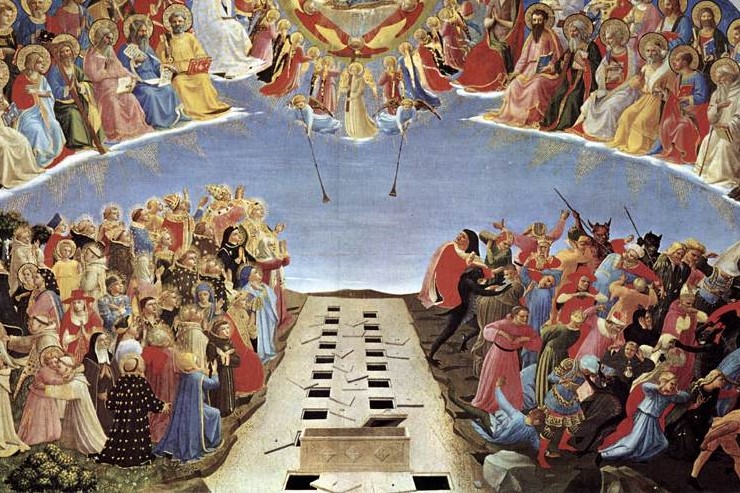We Shouldn’t Be Afraid to Talk about Hell
by Joannie Watson | March 5, 2021 12:04 am
 [1]
[1]
“Recognizing that hell is a reality leads me to a richer life, not anxious one. “
We’re all vitamin D deficient, it seems. I was reading the other day about how helpful vitamin D is against COVID (and yes, if you want to immediately be contradicted or cause controversy, make any statement about COVID). Regardless of whether this is true, the fact remains that most of us are vitamin D deficient. And I had to shrug at the irony. We’ve been told to stay inside. If vitamin D is an important aid, there’s an irony to wringing our hands that everyone is deficient … when we have been cooped up in our houses out of obedience.
It reminded me of a similar wringing of the hands. There’s sometimes a bit of a surprise when Catholics seem to think their religious beliefs don’t need to directly impact their personal life choices. We see it everywhere – people asserting they’re good Catholics while professing things or choosing to act directly contrary to Church teaching. Perhaps it has something to do with the fact that we’re rarely taught about that place called Hell. We can wring our hands about why Catholics think they don’t need to go to Mass or get married in the Church or go to confession, but we’ve never taught them that their actions have consequences. It seems that if hell exists, it’s only filled with axe murderers and dictators.
We reap what we sow. People are deficient in vitamin D because we’ve told people to stay inside. We have generations of Catholics who are deficient in virtue because we’ve told them it’s not necessary.
Now, let me be clear: I’m not saying we should always simply preach hellfire and damnation. We don’t want churches full of people there out of fear. There’s a reason that contrition driven by a fear of hell is called imperfect contrition. God doesn’t desire our obedience out of servile fear. More homilies about hell are not the silver bullet to turning the ship around.
At the same time, consciousness about the reality of hell and the reality that it is a place we could go is part of a well-balanced catechetical narrative. We can’t ignore it simply because it’s uncomfortable and disturbing for people to hear. I should be disturbed that hell is a place I may be writing my own ticket to by my conscious decisions and actions. That should make me uncomfortable.
We must help people understand that actions have consequences, that my decisions matter, and that my baptismal certificate isn’t my one-way-ticket to heaven. Not so that they live in fear, but so that they seek the abundant life that God has to offer.
Living out of fear is never a good thing, but there is a healthy fear of the hell. After all, imperfect contrition is imperfect, but it’s still contrition and is a gift from God (CCC 1453). It prompts and prepares us to receive forgiveness through the sacrament of confession. Rather than avoiding the topic because it’s uncomfortable, we should desire to preach it from the rooftops so that people can find freedom and grace!
Again, I am not advocating that we turn to preaching solely of hellfire and damnation. Scare tactics don’t work, at least not for long. It is not healthy to live consumed in fear, whether that’s fear of hell or fear of COVID. We are living in a society right now where people have begun to fear their neighbors, because we have emphasized the message of how to avoid COVID rather than how to live healthier lives. So we have an inactive, vitamin D-deficient, depressed and isolated world. We reap what we sow.
I’m not saying we should do the same with the Faith. We need to hear the message of the value of living virtuous lives, the importance of growing in friendship with God, and the joy of the abundant life that Jesus came to give us. But we can’t neglect that these things require work and sacrifice and can be lost. Do you really believe Jesus has come to offer you life in abundance? Then don’t be afraid to talk about what that costs. We should want to help people make decisions that lead to heaven, because this is true freedom. Recognizing that hell is a reality leads me to a richer life, not anxious one.
In the end, the answer to all is memento mori. We must remind people to live with the end in mind. Not looking to death in fear, but with a healthy perspective of what is possible. It should inspire us to live seeking friendship with Christ. My actions and choices have consequences. Hell is a reality. It’s a place to which I write my own cover letter and application with my decisions. If I live with the end in mind, knowing this world is passing, I will live in expectation of the next. If we avoid talking about it because it is uncomfortable, we do people a disservice – an eternal one.
Please help spread the Gospel! Share this article on Facebook and other social media.

Please help us continue our mission!
We welcome both one-time and monthly donations. A monthly subscriber giving just $10 a month will help cover the cost of operating Integrated Catholic Life for one day! Please help us bring enriching and inspiring Catholic content to readers around the world by giving today.
Thank you and may God Bless you for supporting the work of Integrated Catholic Life! Integrated Catholic Life Inc is a nonprofit public charity under Internal Revenue Code Section 501(c)(3). These contributions are tax-deductible as provided under U.S. tax laws.
- [Image]: https://www.integratedcatholiclife.org/wp-content/uploads/FraAngelico_LastJudgment.jpg
Source URL: https://integratedcatholiclife.org/2021/03/watson-both-and-lent-1-1/